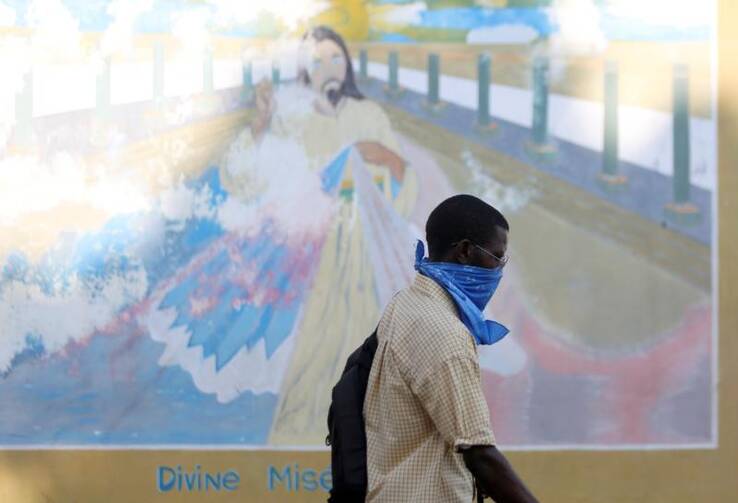WEST PALM BEACH, Fla. (CNS) -- Fearful that the coronavirus pandemic has spread more widely than official numbers suggest, the Haitian government and numerous nongovernmental organizations are bolstering COVID-19 public awareness and hygiene programs.
There also are contingency plans to reactivate a system of "transition centers," permanent structures that were used to isolate and care for patients during the cholera outbreak a decade ago after a massive earthquake claimed tens of thousands of lives.
Haiti had 74 confirmed cases of the coronavirus as of April 27, according to statistics compiled by Johns Hopkins University. There were six deaths attributed to the illness in the country of 11 million people, the vast majority of whom live in poverty.
The presence in Haiti of the coronavirus is particularly alarming to observers given the general fragility of the national health care system and a low inventory of personal protective equipment, ventilators and staffing associated with hospital intensive care beds. Health care observers estimated there are no more than 60 ventilators in the country and even fewer ICU beds.
"We were expecting this, but it created a bit of panic, because everybody is in agreement that Haiti is not prepared to deal with any sort of epidemic as highly contagious as COVID-19," said Beth Carroll, head of programs in Haiti for Catholic Relief Services, the U.S. bishops' international relief and development agency.
"The main concern I hear in Haiti is that the numbers being reported do not accurately reflect the reality," Carroll told CNS.
"Given the (higher) reported numbers in neighboring Dominican Republic and given the amount of contact people here have had, it seems unlikely that these are accurate numbers and would really reflect the numbers of COVID at the moment," Carroll said.
Neighboring Dominican Republic has 6,135 confirmed COVID-19 cases and 278 deaths.
In Haiti, where CRS has 279 employees, many of the rural-based agricultural-project staff members are working with local farmers and others to promote good hygiene practices and appropriate social distancing. Central office staff in Port-au-Prince, the capital, are working from home or traveling to CRS headquarters only for essential tasks, Carroll said.
The current strategy is to leverage CRS community relationships with parishes, local leaders and Caritas Haiti in raising COVID-19 awareness and stressing safe hygiene practices through distribution of hand-washing supplies.
Public sanitary stations are being planned for crucial places, including local markets, bus stops and rural health clinics, Carroll said.
A CRS staffer recently returned from a rural area, where the local rumor was that only foreigners could get sick with coronavirus.
"What they end up hearing is what their neighbor tells them, and maybe what their neighbor heard is what their cousin told them," Carroll said. "So a lot of that passing of the message becomes less about the facts and maybe more about rumors or some type of hopeful thinking."
The U.S. Embassy in Haiti reports that a general curfew remains in place from 8 p.m. to 5 a.m. daily to help enforce social distancing.
Schools are closed, meetings of 10 or more people are discouraged and the government has advised people to wear masks when in public, even though it has been unable to provide a reliable source of personal protective gear.
More worrisome is the reality that most Haitians need to work daily and travel by public transportation in order to support themselves and their families. In Haiti, there is no expectation of public bailouts for small business, unemployment insurance or a stimulus check program.
"If your choice is to stay home and protect yourself from this new virus that you are still learning about and which could make you sick but then also starve to death because you are not working, you may make the decision to go out and work," Carroll said.
She added that Haitians often have a stigma about being identified as sick. That may result in widespread shunning of public testing for COVID-19 if and when that becomes available.
Haiti's Ministry of Health has instituted measures that prioritize home quarantine as the first preference for someone exposed to the coronavirus. However, that may change with the evolution of COVID-19. Transition centers previously used in the cholera outbreak could be retooled if hospitals become overwhelmed with the patients.
Veronica dal Moro, head of programs for the Italy-based AVSI Foundation, said the agency's staff of 250 has reassessed priorities and strategies under the pandemic, favoring youth and community programs that can continue in small groups or remotely.
Many AVSI programs are centered in Port-au-Prince's poorest communities, Cite Soleil and Martissant, where permanent recreational and educational centers are located.
"Mental health support can be given by the psychologists without any risk because it is an individual activity, but with parenting skills or stress relief sessions we manage people in small groups, keeping social distancing and with places for hand washing and sanitation," dal Moro said.
AVSI continues to support rural areas with distribution of food vouchers and cash-for-work programs. Supporting Haitians economically is crucial in a country that underwent an economic crisis in 2019 and which now has its airports, seaports and most commercial activity on hold.
"Haiti is a country that lives a lot on imported goods, especially rice. ... this is worrying," dal Moro said.
"Isolation measures are not really that applicable in countries like Haiti," she added. "People live in small places with a lot of people living inside. Public transportation is very crowded, and it is difficult to imagine that social distancing or isolation measures can be respected."










